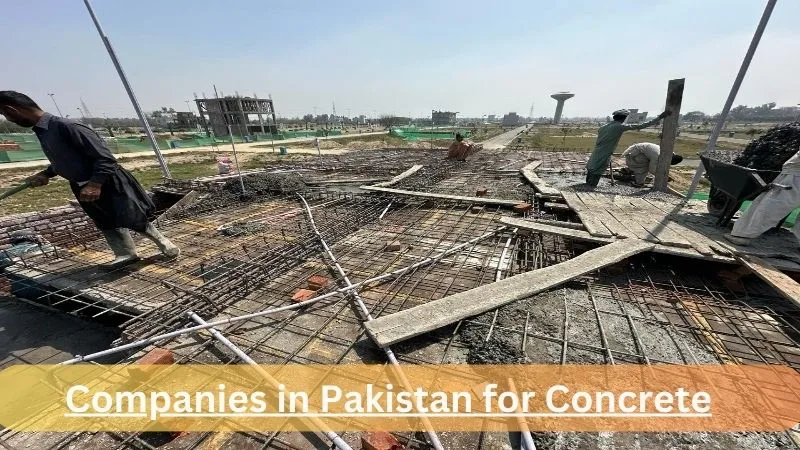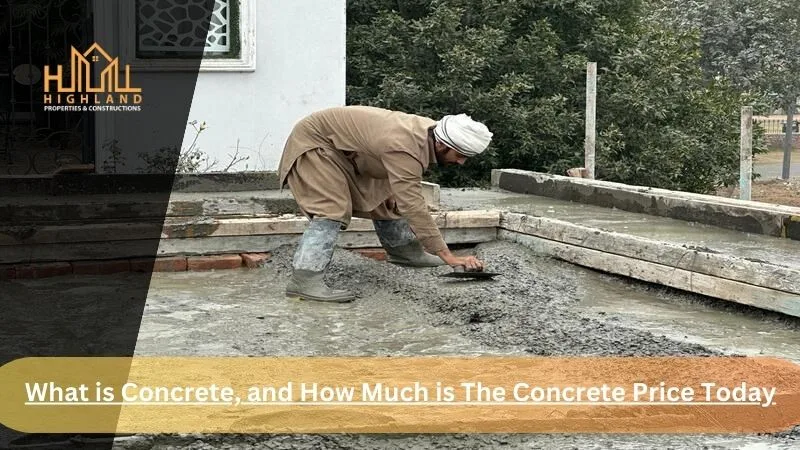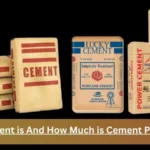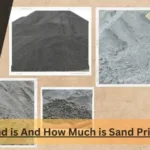Know Your Construction Materials: What is Concrete, and How Much is the Concrete Price Today?
Concrete:
Concrete price today: Concrete is a mixed material (gravel or lime, Cement and water, etc.), sometimes made up of small and large rocks glued together with a paste-like substance to be formed over time.
It’s one of the most common building materials used worldwide and in Pakistan because of its strength, durability, flexibility and pocket-friendly aspect.
Composition of Concrete:
The concrete parts respond to each other in different ways depending on how much of each is added. The proportions will also change depending on the type of concrete being made. The most usual ratio is:
10 to 15% Cement
60–75% of the total
15 to 20% water
Cement: The thing that holds concrete together is Cement. Portland cement is the most popular type of Cement. It is made by heating limestone, clay and other materials in a kiln and then grinding the clinker into a fine powder.
Aggregate: Aggregates are small pieces of stuff like sand, gravel, crushed stone or old concrete that have been reused. They give the concrete mixture bulk and strength.
Water: The Cement needs water to become liquid again and to start the chemical processes that harden the mixture.
Mixing and Placing: Most of the time, concrete is on-site with a concrete mixer. The ingredients are combined in a certain way to get the right strength and workability.
After being mixed, the concrete is brought to the building site and put into forms or moulds. There, it is shaped and packed down using various tools and methods. [Concrete price today]
Hardening: Concrete goes through a hardening process after being poured, making it gradually more complex and vital. Concrete must be cured adequately so that it can develop the qualities that are wanted.
Keeping the concrete wet, adding curing chemicals or covering it with insulating blankets to keep the heat in are all ways to cure concrete. This is called Hydration.
Also Read: Know your construction materials: What Cement is and how much is cement price today
Types of Concrete:
In Pakistan, different types of concrete are used for different structural needs, environmental conditions and project requirements. Below are the different types of concrete used for laying the foundation and structuring a building:
Plain Cement Concrete (PCC)
Reinforced Cement Concrete (RCC)
Reinforced Brick Concrete (RBC)
Prestressed Concrete
Fibre Reinforced Concrete (FRC)
Lime Concrete
Cement Concrete
Sulphur Infiltrated Concrete
High Early Strength Concrete
Polymer Concrete
Waterproof Concrete
Lightweight Concrete
Self-Compacting Concrete
Plain Concrete:
Regular concrete, called “plain concrete,” comprises Cement, water and aggregates (sand and gravel). It is mainly used for non-structural purposes on sidewalks, roads, and low-rise residential buildings where high strength is not needed.
Reinforced Bars Concrete:
Steel Reinforcement Bars (rebar) are mixed into concrete to make reinforced concrete (RC). Although this type of concrete is more flexible and has higher tensile strength than plain concrete, it can still be used for structural purposes in buildings, bridges and infrastructure projects. As a result of its versatility and durability, reinforced concrete is used for many different types of building projects in Pakistan. [Concrete price today]
Reinforced Brick Concrete (RBC):
A building method called Reinforced Brick Concrete (RBC) uses bricks or other masonry pieces along with reinforced concrete to make structural parts.
In RBC construction, bricks are the primary building material, and concrete is added to make the structure more potent and stable.
RBC is often used in load-bearing walls, exterior walls, interior walls, partitions, retaining walls, foundations, lintels and beams, columns, architectural features, etc.
Prestressed Concrete:
Adding internal pressures to prestressed concrete makes it more robust and better at holding weight [Concrete price today]. Methods of prestressing include pre-tensioning and post-tensioning.
Pakistan uses a lot of prestressed concrete for bridges, flyovers and other large-scale building projects.
Fiber Reinforced Concrete (FRC):
For better strength, longevity, and performance, Fiber Reinforced Concrete (FRC) is a type of concrete that uses fibres in the mix.
These fibres can be made from steel, glass, natural fibres like sisal or cellulose, or manufactured fibres like polypropylene, polyethene and nylon.
FRC is most commonly used in industrial floors, warehouse floors, pavements, Tunnel linings to provide structural support, Bridge decks to extend the structure’s service life, precast elements (panels, pipes, barriers, etc.), architectural features, etc.
Lime Concrete:
Lime concrete, also called lime-sand concrete or lime-mortar concrete, is a concrete mix that doesn’t use Portland cement as a binder.
Lime concrete has been used for centuries and was a popular way to build in ancient times.
It is often used in the preservation and restoration of historical buildings, in building projects to lay bricks, stones and other masonry mortar, for plastering and rendering, Flooring and Green building particles, etc.
Cement Concrete:
Concrete, often called “cement concrete,” is a mixed material of water, aggregates (like sand and gravel or crushed stone), and Cement [Concrete price today].
It’s one of the most common building materials used worldwide because it’s robust, long-lasting, flexible and Budget-friendly Budget.
It is used in various construction projects per the requirements and Budget.
Sulphur Infiltrated Concrete:
A hybrid material called Sulfur Infiltrated Concrete (SIC), also called Sulphur-Impregnated Concrete or Sulphur Concrete, is made with sulfur instead of regular Cement as a binding agent.
In building, sulfur-infused concrete is mainly used in certain situations where its unique qualities make it better than regular concrete [Concrete price today].
This type is used in Bridge decks, Industrial flooring, Acid storage tanks, Marine structures and High-temperature applications, etc, which are required.
Highly Early Strength Concrete:
Highly Early strength concrete (HSC) is designed to have higher compressive values than regular concrete mixes. High-rise buildings, heavy industrial structures, and infrastructure projects need more strength and longevity.
High-strength concrete mixes may include unique cementitious materials, aggregates or additives to get the right strength qualities.
Polymer Concrete:
The binding agent in polymer concrete is polymers instead of standard Cement. Polymer concrete is a type of composite material. It has strong qualities, lasts long, doesn’t react with chemicals, and hardens quickly.
Polymer concrete is often used in buildings for various tasks, and its unique qualities make it better than regular concrete.
Polymer concrete is used in industrial flooring, bridge deck overlays, sewer and maintenance hole rehabilitation, precast components, architectural elements, etc.
Waterproof Concrete:
Waterproof concrete, waterproofing admixtures, or integrated waterproofing systems have additives or admixtures that make them more resistant to water and moisture.
Waterproof concrete is often used to build below-grade buildings, water-retaining structures and other places where protecting against water damage is essential.
It is used in water-retaining structures, Tunnels and underground passages, Roof decks and Balconies, Infrastructure projects, etc.
Lightweight Concrete:
Include lightweight aggregates like expanding clay, shale or lightweight synthetic materials in the concrete mix to make lightweight concrete.
This type has lower density and better thermal insulation features than regular concrete. Its many uses include soundproofing, insulating against heat loss, and other uses for weight reduction, such as roof blocks and precast panels.
Self-Compacting Concrete:
Self-compacting concrete (SCC) is a remarkably fluid concrete mix that can fill complex forms and heavily reinforced areas without shaking.
For example, in Pakistan, SCC is often used for tall buildings, heavily reinforced structures, and architectural concrete features, which need to be easy to place, have a better finish, and require less work.
These are some of the main kinds of concrete used in Pakistani building projects.
Engineers and builders can choose the best concrete mix for their project needs because each type has its features and benefits.
Different admixtures, fillers, and extra cementitious materials can be added to concrete mixes to make them work better and last longer.
Advantages of Concrete:
As a building material, concrete is widely used because it has many benefits that make it sound. Here are some of the best things about concrete:
Strong and Long-Lasting:
Concrete has a very high compressive strength, which makes it suitable for building supports, columns, beams, and walls that hold weight. It can carry heavy loads and won’t change shape over time, so the building will last long.
Flexibility:
Concrete can be shaped and formed differently to fit different design needs and building styles [Concrete price today]. It can be shaped and textured in complex ways, making it useful in many design and building situations.
Fire Resistance:
Concrete is naturally fire-resistant. It doesn’t burn or give off harmful fumes when it comes to contact with fire. They can be used for fire-rated construction because of this trait. It provides passive fire protection and makes buildings and structures safer.
Whether Resistant:
Concrete can withstand rain, wind, and sunshine and can be used outside and in direct sunlight. It can withstand harsh weather conditions as long as it doesn’t get too damaged.
Low Maintenance:
Compared to other building materials, concrete doesn’t need much upkeep. Pests can’t get into it. It’s easy to clean, and you don’t have to paint or seal it often. Checking and fixing concrete buildings regularly can help them last longer.
Value for Money:
Concrete is cheaper than steel or wood for building supplies. It is easy to find and can be bought close to home, reducing travel costs. It will also save you money over the life of the building because it lasts a long time and doesn’t need much upkeep.
Energy-efficient:
Concrete has a lot of thermal mass, which means it can take in and hold heat [Concrete price today]. This quality helps keep the temperature inside buildings stable, which saves money on heating and cooling costs and makes them more energy efficient.
Sustainability:
Concrete can be made from materials that are easy to get in the area, which lowers the damage that shipping does to the environment. Also, recycled materials like fly ash, slag and recycled aggregates can be used, which cuts down on trash and resource use.
Sound Insulation:
Concrete is an excellent sound insulator because it keeps noise from travelling between rooms and buildings. It’s often used in soundproof walls, floors and sound barriers to make places to live and work quiet and relaxing.
Flexibility in design:
Concrete can be mixed with other materials, like steel, glass, and wood, to make hybrid buildings stronger and look better. It can also be stained, Coloured or textured to meet specific design goals and create building effects.
Price of Concrete:
| No | Material | measurement | Price | Area Square Feet |
|---|---|---|---|---|
| 1 | Cement | 8 Bags | 10,000 | 100 Sqf |
| 2 | Crush | 35 Cubic Feet | 4,200 | 100 Sqf |
| 3 | Sand | 35 Cubic Feet | 1,575 | 100 Sqf |
| 4 | Steel | 40Kg | 20,000 | 100 Sqf |
Companies in Pakistan for Concrete:

Multiple businesses in Pakistan make and sell concrete. Some well-known companies in Pakistan that make or sell concrete goods are listed below:
Lafarge Pakistan Cement Limited: Lafarge is an excellent world company that makes building materials and has a branch in Pakistan. They make and sell a lot of different building supplies, like concrete, Cement and rocks.
For example, Best way Cement Limited is one of the biggest cement companies in Pakistan. They sell cement goods, like ready-mix concrete, for other building uses.
DG Khan Cement Company Limited: Another big name in Pakistan’s cement business is DG Khan Cement. They make Cement and concrete goods for building homes, businesses, and roads.
Fauji Cement Company Limited: Fauji Cement is a well-known cement company in Pakistan that makes a variety of cement goods, such as concrete, for building projects.
The Maple Leaf Cement Factory Limited: has been making Cement in Pakistan for a long time. They make many kinds of cement goods and help builders with their concrete needs.
Attock Cement Pakistan Limited: Attock Cement is one of the biggest companies that makes Cement, and it has factory operations in Pakistan. For different building needs, they make Cement and concrete options.
Power Cement Limited: A Pakistani company that makes Cement and sells various cement goods, such as concrete, for building projects.
The Flying Cement Company Limited is a relatively new company in Pakistan’s cement business. They make Cement and offer concrete options for building projects.
These are just a few examples of businesses in Pakistan that sell and make concrete [Concrete price today]. Smaller companies, local suppliers and ready-mix concrete makers all over the country also serve the needs of the building industry.
Project:
The concrete used in any construction project is decided based on its nature, size req, requirements, etc.
Competency:
A skill is the specific ability to do a job. Competence, on the other hand, means that a person knows how to do the task correctly [Concrete price today]. Knowledge, experience, attitude, personality, and physical skills are also parts of competence.
It’s hard to define and set the criteria for ” competency ” as it’s subjective. But for starters, you need to compare the training someone has had with the jobs they will be doing or have done, as well as their knowledge and skills. In other words, their experience in the field.
For that, you can conduct market research, shortlist the names of the companies from which you wish to get quotations for your construction project and visit them.
But ensure that the team you hire is competent and uses your resources effectively. Be it just the Cement or otherwise. Always go for a professional. Lucky for you, we happen to be one.
Our Services:
Highland Properties and Constructions has a track record of giving excellent and unmatched construction project results over the past decade.
Our vision is about transparency, value generation, and exceeding our customer’s expectations in every manner that matters.
In addition to that, once we have someone on board, we are a team for them and have their back. Our cooperation and understanding go a long way with our clients. For more details, you can go through our portfolio. Also, here’s a link to what our clients say about us in the long run.
Summary:
This blog has discussed what concrete and Concrete price today is, its types, advantages, and several uses, along with top companies providing quality concrete solutions. It also includes our introduction and why Highland Properties and Constructions should be your go-to option if you want durability in your life for your dream project!
Concrete price today-FAQ’s:
Q1: What is concrete made of?
A1: Concrete is made by mixing Cement, aggregates (such as sand, gravel, or crushed stone), water and sometimes additives or admixtures. The Cement is a binder that holds the aggregates together, forming a solid and durable material.
Q2: What are the main advantages of using concrete in construction?
A2: Concrete offers several advantages in construction, including high strength, durability, fire resistance, weather resistance, low maintenance requirements and versatility in design. It is also cost-effective, energy-efficient and environmentally sustainable compared to other building materials.
Q3: How does concrete help buildings stay strong?
A3: Concrete helps buildings stay strong by providing a sturdy foundation and structural support. It’s made by mixing Cement, gravel, sand and water, creating a solid material that can withstand heavy loads and resist wear and tear over time.





Leave a Reply